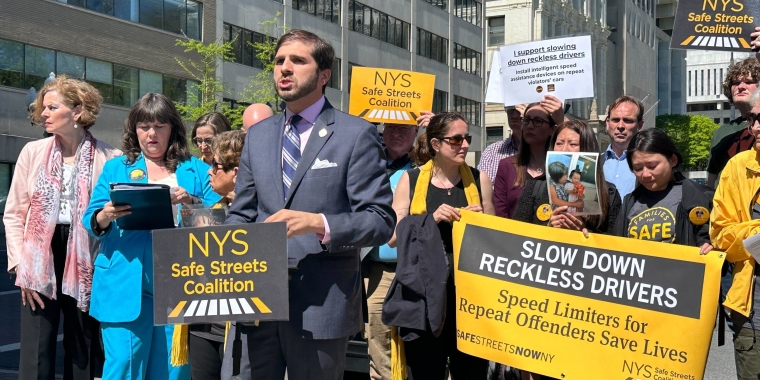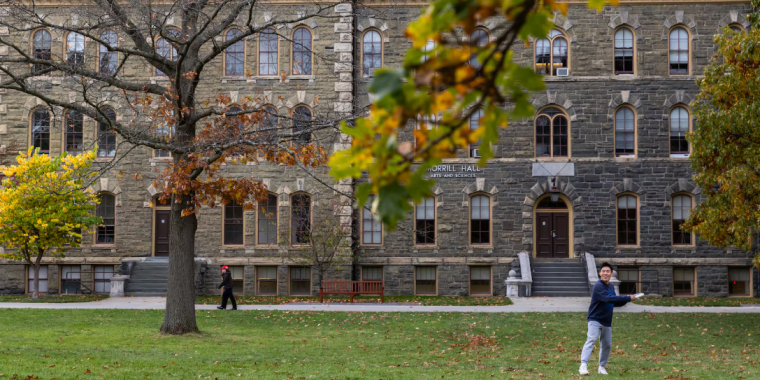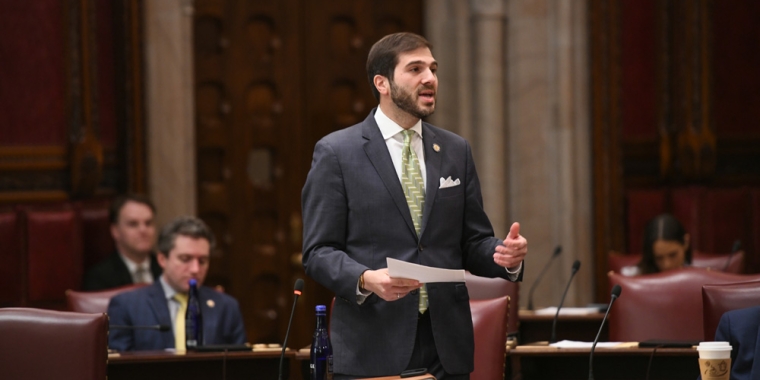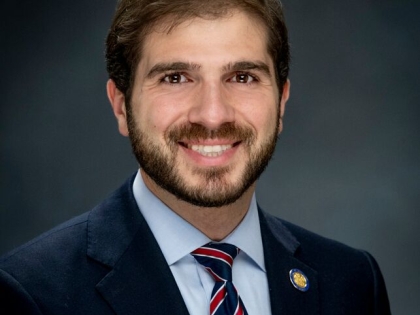
New York's Working Families Struggling with Housing + Food Insecurity, New Report Finds. The Working Families Tax Credit Would Bridge the Gap
January 23, 2024
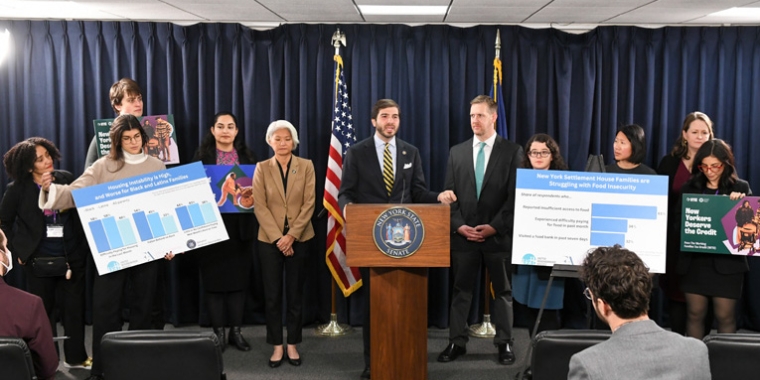
Proposed New York State Working Families Tax Credit would fill gaps in current state tax credits and increase benefits for all families so they can afford essentials like food, clothes and rent.
ALBANY, NY - Working families in New York are struggling with ongoing economic precarity and persistent hardship since the expanded federal Child Tax Credit expired in December 2021, a new report finds. But the proposed New York Working Families Tax Credit is an effective poverty-fighting tool that can put much-needed cash in the hands of New Yorkers to pay for food, rent, and other essentials.
The new report, Progress Lost: Hardships Persist for New York Families After the End of the Expanded Child Tax Credit, was authored by United Neighborhood Houses (UNH) and Educational Alliance (EA), and highlights the challenges facing many New York families within the settlement house network. The report is a follow-up to the Settlement House American Rescue Plan (SHARP) Impact Study released in Fall 2022. The first report surveyed more than 1,000 families within the UNH settlement house network in New York on the impact of the expanded federal Child Tax Credit (CTC) included in the 2021 American Rescue Plan Act, which enabled qualifying families to receive a portion of the credit as advance monthly cash payments from July 2021 through December 2021. This first study found that giving cash to people in need made a difference: the funds provided immediate relief, and families spent the money on basic needs, including 60 percent who used it to pay for food, with rent, clothing and utilities also highly used categories.
The follow-up report is based on a second wave of surveys conducted in late 2022 (Oct. 2022 through Jan. 2023) after the expanded CTC expired. The new data shows families continue to experience persistent, ongoing challenges such as food insecurity, financial precarity, debt burdens and housing instability since the expiration of the expanded federal CTC. Among the key findings are:
- Nearly 40 percent of parents surveyed said that they “always” or “often” ran out of money in the past six months
- One-third (33 percent) of surveyed parents had visited a food bank in the last seven days.
- Nearly half (48 percent) of surveyed parents said that it was hard to pay for their housing; Black and Latinx parents were more likely than other parents in the full sample to have reported experiencing housing-related hardships.
- More than one in five surveyed parents reported carrying more than $10,000 in non-mortgage-related debt, such as credit card or student loan debt.
Recent data released by the Census Bureau confirms the difficult reality faced by many families—child poverty more than doubled nationwide since the expiration of the CTC and child poverty rates in New York are on the rise again. This new report details how to better understand the existing needs facing New York’s families since the expiration of the expanded federal Child Tax Credit while sharing concrete policy recommendations to strengthen economic security within New York’s communities.
The report calls for the State to create tax credit reforms such as those laid out in the Working Families Tax Credit (S277B-Gounardes / A4022B-Hevesi). The Working Families Tax Credit combines the current New York State Earned Income Tax Credit (EITC), Empire State Child Tax Credit (ESCC), and the dependent exemption (DE) to provide working families with increased support while streamlining duplicative tax benefits. It increases the value of the credit to between $500 and $1600 per child on a sliding scale and indexed to inflation, eliminates the phase-in thus allowing those with the lowest income to receive the largest credit, grants quarterly payments to families, and includes all families regardless of citizenship status, among other reforms.
Today’s press event follows a bipartisan deal announced by Congress last week that would expand the federal child tax credit by lifting the credit's $1,600 refundable cap and adjusting it for inflation. The State does not match the federal CTC value in its ESCC, further highlighting the need for the Working Families Tax Credit in New York.
The report calls for additional recommendations including the creation of a SNAP for All food benefit for New Yorkers ineligible for SNAP due to immigration status, and increasing State funding for the Settlement House Program, among others.
“This powerful new report from United Neighborhood Houses and Educational Alliance confirms what we’ve known for years: working families are struggling to get by in New York," said State Senator Andrew Gounardes. "If we want this state to be a place where families have a shot at making it, we have to give them the resources to take that shot. My Working Families Tax Credit can give New Yorkers the support they need to make ends meet, whether that be buying essentials like groceries and clothes, or simply paying rent to keep the roof over their head. If a divided, polarized Congress can do it, New York can too. It's time for us to step up and do right by working families.”
Assemblymember Andrew Hevesi said, "We cannot lose the progress made under the expanded Child Tax Credit and it is incumbent upon our state to fill in the gaps, absent the expanded credit, by implementing the Working Families Tax Credit this year. It is estimated that the WFTC would reduce poverty by 13.4% among those under 18 years old. I want to thank UNH and all of our allies here today, especially Senator Gounardes for working to make WFTC a reality."
“The struggles of working families have been exacerbated by the pandemic, but the Working Families Tax Credit can be an effective tool to ease this burden and lift families, and especially children, out of poverty." said State Senator Iwen Chu. “Grocery bills have increased, transportation costs continue to rise, and New Yorkers are having to make tough financial decisions while not being able to see beyond their next paycheck. I’m proud to fight to keep money in the pockets of the most vulnerable New Yorkers and invest in working families.”
“By putting money back into the pockets of people who need it most, the Working Families Tax Credit (WFTC) offers financial empowerment to hardworking families”, says Susan Stamler, Executive Director of United Neighborhood Houses (UNH). “Our newest report, Progress Lost: Hardships Persist for New York Families After the End of the Expanded Child Tax Credit, outlines the economic hardships many settlement house families experience daily and suggests tangible policy recommendations to strengthen communities, including passing the WFTC. UNH is committed to helping ease the financial burdens New Yorkers face, and we will continue to work with our partners–including Senator Gounardes, Assemblymember Hevesi and Educational Alliance–on this important issue.”
"All of us at Educational Alliance are firmly committed to addressing the persistent challenges faced by New York families,” said Rich Baum, President and CEO of Educational Alliance. “Our legacy as a settlement house informs our dedication to advocating for policies like the Working Families Tax Credit, aiming to provide vital support to those in need. Together with our partners like United Neighborhood Houses, we strive to uplift communities and ensure a brighter, more equitable future for all New Yorkers."
Liza Schwartzwald, Director of Economic Justice and Family Empowerment, New York Immigration Coalition, said: “New Yorkers are facing a daunting affordability crisis with no real end in sight, as working families struggle to pay for housing, groceries and child care. And when families can’t make ends meet, our entire economy suffers. As the SHARP Wave 2 report shows, putting cash in the hands of more New York families through the tax credit system allows them to bridge that gap and better meet their financial obligations. The Working Families Tax Credit will improve the lives of nearly every New York family with children – regardless of their immigration status – helping them keep afloat so they can give their kids the best opportunity to succeed. Turning this bill into law is imperative in building a future for our State where immigrant and low-income families can thrive, while contributing to our collective economy and culture.”
“With New York’s child poverty rate persistently higher than the national average, and an ambitious target established that has committed the state to reduce child poverty by 50% over the next 9 years, New York must prioritize poverty-fighting policies like the robust, targeted, fully refundable Working Families Tax Credit,” said Kate Breslin, President and CEO of the Schuyler Center for Analysis and Advocacy. “The WFTC credit builds upon the strengths of New York’s Empire State Child Credit and Earned Income Tax Credit, and corrects their shortcomings. The path to ending child poverty requires proven policy solutions – the WFTC is a crucial step toward ensuring that every child in New York has the opportunity to thrive.”
“As one of the nation’s largest free tax assistance providers, Food Bank For New York City understands how impactful tax credits are for families facing financial hardship. Food Bank's free tax filing program is one of our most impactful services that each year helps tens of thousands of low-income New Yorkers beyond food,” said Leslie Gordon, President and CEO of Food Bank For New York City. “The Working Families Tax Credit will provide critical refunds to cover basic needs like food, shelter, medicines, and educational costs, and will be an economic driver for New York State by putting tax dollars back into our communities and keeping folks working.”
Progress Lost: Hardships Persist for New York Families After the End of the Expanded Child Tax Credit is available at www.unhny.org/reports.
###
About Educational Alliance
Educational Alliance (EA) brings together and partners with diverse communities in Lower Manhattan, offering individuals and families high-quality, multi-generational programs and services that enhance their well-being and socioeconomic opportunities. A nonprofit beacon of hope for over 130 years, Educational Alliance believes in the power of communities to lift up people of all ages and turn strangers into neighbors. Our network of community centers and community-based programs in Lower Manhattan offer high-quality, affordable education programs, health services, and diverse cultural enrichment right where New Yorkers live, work, learn, and raise their families. We make the city a brighter, friendlier and more supportive place. Guided by Jewish values, Educational Alliance celebrates the differences and individuality every person brings when they walk through our doors because we know that there is more that connects us than keeps us divided. We invite you to join us as we partner with our neighbors, strengthen our city, and pave the way for more generations of New Yorkers to live enriched and fulfilling lives – because you belong here.
About United Neighborhood Houses
United Neighborhood Houses (UNH) is a policy and social change organization representing neighborhood settlement houses that reach 770,000 New Yorkers from all walks of life. A progressive leader for more than 100 years, UNH is stewarding a new era for New York’s settlement house movement. We mobilize our members and their communities to advocate for good public policies and promote strong organizations and practices that keep neighborhoods resilient and thriving for all New Yorkers. UNH leads advocacy and partners with our members on a broad range of issues including civic and community engagement, neighborhood affordability, healthy aging, early childhood education, adult literacy, and youth development.
Media Contacts:
Billy Richling
Communications Director
State Senator Andrew Gounardes
billy@senatorgounardes.nyc
J.T. Falcone
Deputy Director, Policy & Communications
United Neighborhood Houses
jfalcone@unhny.org
Sarah Rebell
Director of Communications
Educational Alliance
sarebell@edalliance.org
related legislation
Share this Article or Press Release
Newsroom
Go to Newsroom